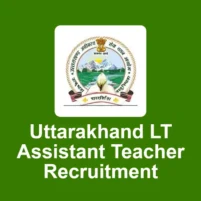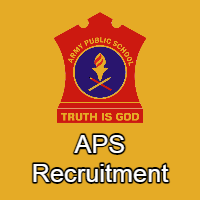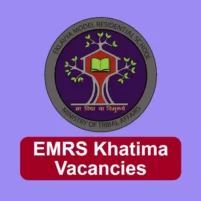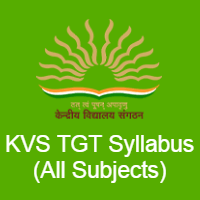Kendriya Vidyalaya Sangathan has initiated to conduct open competitive exam for the direct recruitment of 1409 Posts of Post Graduate Teacher (PGT) all over India. The written exam for KVS PGTs (Hindi, English, History, Geography, Economics, Biology, Chemistry, Physics, Mathematics, Commerce, Computer Science and Biotechnology) is scheduled to be conducted as per the recruitment notification and exam schedule. KVS PGT Syllabus 2023 for Hindi, English, History, Geography, Economics, Biology, Chemistry, Physics, Mathematics, Commerce and Computer Science teacher recruitment exam is given below.
KVS PGT Syllabus and Exam Scheme PDF Download
KVS PGT Selection process will consist of Written Exam/ Computer Based Test-CBT (180 Marks) and Professional Competency Test (60 Marks). KVS PGT written exam will consist of total 180 Objective type multiple choice questions (01 Mark each). The written exam will be of 03 Hours (180 Minutes) duration. While the Professional Competency Test will be of total 60 Marks consisting Demo Teaching and Interview each of 30 Marks.
For online application form, vacancy details, salary, educational qualification, notification and other details about the KVS PGT Recruitment, check the information on the link below.
See also: KVS PGT TGT Primary Teacher Recruitment 13404 Posts 2023
KVS PGT Examination Scheme
Written Examination (Online) – As per the latest KVS PGT Scheme, the written exam question paper consists of 04 Parts i.e. Part-1 (Proficiency in Languages), Part-2 (General awareness, Reasoning and Proficiency in Computers), Part-3 (Perspectives on Education and Leadership) and Part-4 (Subject-specific) as per the Pattern (Scheme) below:
- Part 1: Proficiency in Languages (20 marks)
- Part 2: General awareness, Reasoning and Proficiency in Computers (20 marks)
- Part 3: Perspectives on Education and Leadership (40 marks)
- Part 4: Subject-specific (100 marks)
Professional Competency Test – The Professional Competency Test will be of maximum 60 Marks consisting Demo Teaching and Interview each of 30 Marks.
Demo Teaching -30 Marks
Interview – 30 Marks
Candidates shortlisted on the basis of performance in written examination will be called for Professional Competency Test depending on the number of vacancies. Final merit list will be prepared on the basis of performance of candidates in Written Test and Professional Competency Test taken together. The weightage of Written Exam and Professional Competency Test (Demo Teaching: 15 and Interview: 15 will be 70:30.
KVS PGT Syllabus (All Subjects)
The latest and detailed syllabus for Part-1 (Proficiency in Languages), Part-2 (General awareness, Reasoning & Proficiency in Computers), Part-3 (Perspectives on Education and Leadership) and Part-4 (Subject specific: Hindi, English, History, Geography, Economics, Biology, Chemistry, Physics, Mathematics, Commerce, Computer Science and Biotechnology) is as follows:
PART 1: Proficiency in Languages (20 Marks)
General English – Reading comprehension, word power, Grammar & usage (10 Questions)
General Hindi – पठन कौशल, शब्द सामर्थ्य, व्याकरण एवं प्रयुक्ति (10 Questions)
PART 2: General Awareness, Reasoning and Proficiency in Computers (20 Marks)
General Knowledge and Current Affairs – 10 Questions
Reasoning Ability – 05 Questions
Computer Literacy – 05 Questions
PART 3: Perspectives on Education and Leadership (40 Marks)
(a) Understanding the Learner – 15 Questions
(i) Concept of growth, maturation and development, principles and debates of development, development tasks and challenges.
(ii) Domains of Development: Physical, Cognitive, Socio-emotional, Moral etc., deviations in development and its implications.
(iii) Understanding Adolescence: Needs, challenges and implications for designing institutional support.
Role of Primary and Secondary Socialization agencies. Ensuring Home school continuity.
(b) Understanding Teaching Learning – 15 Questions
(i) Theoretical perspectives on Learning- Behaviorism, Cognitivism and Constructivism with special reference to their implications for: The role of teacher; The role of learner; Nature of teacher-student relationship, Choice of teaching methods, Classroom environment, Understanding of discipline, power etc.
(ii) Factors affecting learning and their implications for: Designing classroom instructions; Planning student activities; Creating learning spaces in school.
(iii) Planning and Organization of Teaching-Learning: Concept of Syllabus and Curriculum, Overt and Hidden Curriculum, Principles of curriculum organization; Competency based Education, Experiential learning etc; Instructional Plans: Year Plan, Unit Plan, Lesson Plan; Instructional material and resources; Information and Communication Technology (ICT) for teaching-learning; Evaluation: Purpose, types and limitations. Continuous and Comprehensive Evaluation, Characteristics of a good tool; Assessment of learning, for learning and as learning: Meaning, purpose and considerations in planning each.
(iv) Enhancing Teaching Learning processes: Classroom Observation and Feedback, Reflections and Dialogues as a means of constructivist teaching.
(c) Creating Conducive Learning Environment – 04 Questions
(i) The concepts of Diversity, disability and Inclusion, implications of disability as social construct, types of disabilities- their identification and interventions.
(ii) Concept of School Mental Health, addressing the curative, preventive and promotive dimensions of mental health for all students and staff. Provisioning for guidance and counselling.
(iii) Developing School and community as a learning resource.
(d) School Organization and Leadership – 04 Questions
(i) Leader as reflective practitioner, team builder, initiator, coach and mentor.
(ii) Perspectives on School Leadership: instructional, distributed and transformative.
(iii) Vision building, goal setting and creating a School development Plan.
(iv) Using School Processes and forums for strengthening teaching learning-Annual Calendar, time-tabling, parent teacher forums, school assembly, teacher development forums, using achievement data for improving teaching-learning, School Self Assessment and Improvement.
(v) Creating partnerships with community, industry and other neighbouring schools and Higher Education Institutes – forming learning communities.
(e) Perspectives in Education – 02 Questions
(i) NEP-2020: Curriculum and Pedagogy in Schools: Holistic & Integrated Learning; Equitable and Inclusive Education: Learning for All; Competency based learning and Education.
(ii) Guiding Principles for Child Rights, Protecting and provisioning for rights of children to safe and secure school environment, Right of Children to free and Compulsory Education Act, 2009.
(iii) Historically studying the National Policies in education with special reference to school education.
(iv) School Curriculum Principles: Perspective, Learning and Knowledge, Curricular Areas, School Stages- Pedagogy & Assessment.
PART 4: Subject-specific Syllabus (100 Marks)
KVS PGT Syllabus for all the subjects (Hindi, English, History, Geography, Economics, Biology, Chemistry, Physics, Mathematics, Commerce, Computer Science and Biotechnology) is given here with topics. For the detailed syllabus of each subject you can download the pdf file provided by Kendriya Vidyalaya Sangathan directly through the link below.
In the PGT written exam the Subject specific syllabus includes the concepts of NCERT/CBSE syllabus and Text Books (Classes XI & XII). However, the questions will be testing the depth of understanding and application of these concepts at the level of Post-Graduation.
PGT Biology Syllabus
The Living World, Biological Classification, Plant Kingdom, Animal Kingdom, Morphology of Flowering Plants, Anatomy of Flowering Plants, Structural Organisation in Animals, Cell-The Unit of Life, Biomolecules, Cell Cycle and Cell Division, Photosynthesis in Higher Plants, Respiration in Plants, Plant- Growth and Development, Breathing and Exchange of Gases, Body Fluids and Circulation, Excretory Products and their Elimination.
Locomotion and Movement, Neural Control and Coordination, Chemical Coordination and Integration, Sexual Reproduction in Flowering Plants, Human Reproduction, Reproductive Health, Principles of Inheritance and Variation, Molecular Basis of Inheritance, Evolution, Human Health and Diseases, Biotechnology – Principles and Processes, Biotechnology and its Application, Organisms and Populations, Ecosystem, Biodiversity and Conservation.
PGT Biotechnology Syllabus
Introduction to Bio-technology, Fundamentals of Biochemical engineering, Biotechnology and Society, Biochemistry, Biomolecules, Techniques, Instrumentation and principles, Cellular techniques, Cell Biology (Cell structure and components, Cell growth and development), Genetics and Molecular Biology (Principles of Genetics, Genome function).
Protein and gene manipulation (Protein Structure and engineering, Recombinant DNA Technology, Genomics and Bioinformatics), Cell culture technology (Microbial cell culture and its applications, Plant Cell culture and applications, Animal cell culture and applications), Immunology and Applied Biotechnology.
PGT Chemistry Syllabus
Basic Concepts of Chemistry, Structure of Atom, Classification of Elements and Periodicity in Properties, Chemical Bonding and Molecular Structure, Chemical Thermodynamics, Equilibrium, Redox Reactions, Organic Chemistry- Some Basic Principles and Techniques, Classification of Hydrocarbons (Aliphatic Hydrocarbons and Aromatic Hydrocarbons), Solutions, Electrochemistry, Chemical Kinetics, d and f Block Elements, Coordination Compounds, Haloalkanes and Haloarenes, Alcohols, Phenols and Ethers, Aldehydes, Ketones and Carboxylic Acids, Amines, Biomolecules.
PGT Mathematics Syllabus
Sets, Relations & Functions, Trigonometric Functions, Complex Numbers and Quadratic Equations, Linear Inequalities, Permutations and Combinations, Binomial Theorem, Sequence and Series, Straight Lines, Conic Sections, Introduction to Three-dimensional Geometry, Limits and Derivatives, Statistics, Probability, Relations and Functions, Inverse Trigonometric Functions, Matrices, Determinants, Continuity and Differentiability, Applications of Derivatives, Integrals, Applications of the Integrals, Differential Equations, Vectors, Three – dimensional Geometry, Linear Programming, Probability.
PGT Physics Syllabus
Units and Measurements, Motion in a Straight Line, Motion in a Plane, Laws of Motion, Work, Energy and Power, Motion of System of Particles and Rigid Body & System of Particles and Rotational Motion, Gravitation, Mechanical Properties of Solids, Mechanical Properties of Fluids, Thermal Properties of Matter, Thermodynamics, Behavior of Perfect Gases and Kinetic Theory of Gases, Oscillations and Waves.
Electric Charges and Fields, Electrostatic Potential and Capacitance, Current Electricity, Magnetic Effects of Current and Magnetism, Magnetism and Matter, Electromagnetic Induction and Alternating Currents, Electromagnetic Waves, Ray Optics and Optical Instruments Ray Optics, Wave optics, Dual Nature of Radiation and Matter, Atoms & Nuclei, Semiconductor Electronics.
PGT Commerce Syllabus (Accountancy & Business Studies)
(A) Accountancy – Introduction to Accounting, Theory Base of Accounting, Recording of Business Transactions, Trial balance and Rectification of Errors, Financial Accounting-II, Accounting for Partnership Firms, Accounting for Partnership firms- Reconstitution and Dissolution, Retirement and death of a partner, Dissolution of a partnership firm, Accounting for Share Capital, Accounting for Debentures, Financial statements of a Company, Cash Flow Statement.
(B) Business Studies – Foundation of Business, Evolution and Fundamentals of Business, Forms of Business organizations, Public, Private and Global Enterprises, Business Services, Emerging Modes of Business, Social Responsibility of Business and Business Ethics, Finance and Trade-Sources of Business Finance, Small Business and Enterprises, Internal Trade, International trade, Nature and Significance of Management, Principles of Management, Business Environment, Planning, Organising, Staffing, Directing, Controlling, Financial Management, Financial Markets, Marketing, Consumer Protection.
PGT Computer Science Syllabus
Computer Systems and Organisation, Computational Thinking and Programming, Society, Law and Ethics, Computational Thinking and Programming-2, Computer Networks, Database Management, Introduction to Computer System, Introduction to Python, Database concepts and the Structured Query Language, Emerging Trends, Data Handling using Pandas, Database Query using SQL, Introduction to Computer Networks, Societal Impacts.
PGT Economics Syllabus
Introduction, Collection, Organisation and Presentation of data, Statistical Tools and Interpretation, Introduction to Microeconomics, Consumer’s Equilibrium and Demand, Producer Behaviour and Supply, Forms of Market and Price Determination under Perfect Competition with simple applications, National Income and Related Aggregates, Money and Banking, Determination of Income and Employment, Government Budget and the Economy, Balance of Payments, Development Experience (1947-90) and Economic Reforms since 1991, Current challenges facing Indian Economy, Development Experience of India.
PGT English Syllabus
Reading: Unseen passage (Factual, descriptive or literary) to assess comprehension, interpretation inference and vocabulary, Unseen case-based passage with verbal/ visual inputs like statistical data, charts etc., Note Making and Summarization based on a passage.
Creative Writing Skills: Notice, Formal/ Informal Invitation and Reply, Letters based on verbal/visual input, Article/ Report Writing, descriptive and analytical in nature, based on verbal inputs. Classified Advertisements, Poster, Writing a Speech in 120-150 words based on verbal/ visual clues related to some contemporary / age-appropriate topic, Debate on contemporary topical issues based on visual/ verbal inputs.
Grammar: Questions on Gap filling (Tenses, Clauses), Questions on re-ordering/ transformation of sentences.
The Portrait of a Lady, A Photograph, “We’re Not Afraid to Die… if we can be together, Discovering Tut: the Saga Continues, The Laburnum Top, The Voice of the Rain, Childhood, The Adventure; Silk Road, Father to Son.
The Summer of the Beautiful White Horse, The Address, Mother’s Day, Birth, The Tale of Melon City.
The Last Lesson, Lost Spring, Deep Water, The Rattrap, Indigo, Poets and Pancakes, The Interview, Going Places, My Mother at Sixty-Six, Keeping Quiet, A Thing of Beauty, A Roadside Stand, Aunt Jennifer’s Tigers, The Third Level; The Tiger King, Journey to the end of the Earth, The Enemy, On the Face of It, Memories of Childhood, The Cutting of My Long Hair, We Too are Human Beings.
PGT Geography Syllabus
Geography as a Discipline, The Earth, Landforms, Climate, Water (Oceans), Life on the Earth, India-Physical Environment, Physiography, Climate, Vegetation and Soil, Hazards and Disasters: Causes, Consequences and Management, Fundamentals of Maps, Topographic and Weather Maps, People, Human Activities, Human Settlements, Transport, Communication and Trade, Resources and Development, Transport, Communication and International Trade, Geographical Perspective on selected issues and problems.
PGT History Syllabus
Writing and City Life (Iraq, 3rd millennium BCE), An Empire across Three Continents (Roman Empire, 27BCE to 600 CE), Nomadic Empires (The Mongol, 13th to 14th century), The Three Orders (Western Europe 13th – 16th century), Changing Cultural Traditions (Europe 14th -17th century), Displacing Indigenous People (North America and Australia, 18th to 20th century).
Paths to Modernization (East Asia, late 19th to 20th century), Bricks, Beads and Bones (The Harappan Civilization); Kings, Farmers and Towns; Kinship, Caste and Class (Early Society Societies C. 600 BCE-600 CE), Thinkers, Beliefs and Buildings (Cultural Developments C. 600 BCE – 600 CE), Through the eyes of Travellers [Perceptions of Society (tenth to seventeenth century)], Bhakti- Sufi Traditions [Changes in Religious Beliefs and Devotional Texts (eighth to eighteenth centuries)].
An Imperial Capital: Vijayanagara (fourteenth to sixteenth centuries), Peasants, Zamindars and the State (Agrarian Society and the Mughal Empire C. sixteenth-seventeenth centuries), Colonialism and the Countryside: Exploring Official Archives, Rebels and the Raj: 1857 Revolt and its Representations, Mahatma Gandhi and the Nationalist Movement, Framing the Constitution.
PGT Hindi पाठ्यक्रम
पाठ्यपुस्तक – आरोह-भाग 1, एनसीईआरटी, नई दिल्ली द्वारा प्रकाशित
गद्यखंड – प्रेमचंद: नमक का दरोगा, कृष्णा सोबती: मियाँ नसीरुद्दीन, सत्यजित राय: अपू के साथ ढाई साल, बाल मुकुंद गुप्त: विदाई-संभाषण, शेखर जोशी: गलता लोहा, मन्नू भंडारी: रजनी, कृश्न चंदर: जामुन का पेड़, जवाहर लाल नेहरू: भारत माता।
काव्यखंड – कबीर: हम तौ एक एक करि जांनां; मीराः मेरे तो गिरधर गोपाल, दूसरो न कोई; भवानी प्रसाद मिश्र: घर की याद, त्रिलोचन: चम्पा काले-काले अच्छर नहीं चीन्हती, दुष्यंत कुमार: ग़ज़ल, अक्कमहादेवी: हे भूख! मत मचल, हे मेरेजूही के फूल जैसे ईश्वर; अवतार सिंह पाश: सबसे खतरनाक; निर्मला पुतुल: आओ, मिल कर बचाएँ।
सहायक पाठ्यपुस्तक – वितान-भाग 1, एनसीईआरटी, नई दिल्ली द्वारा प्रकाशित
कुमार गंधर्व: भारतीय गानयकाओं में बेजोड़: लतामंगेशकर, अनपुम मिश्र: रािस्थान की रजत बूँदें, बेबीहलदार: आलो-आाँधारि।
पाठ्यपुस्तक – आरोह-भाग 2, एनसीईआरटी, नई दिल्ली द्वारा प्रकाशित
काव्यखंड – हरिवंश राय बच्चन: आत्मपरिचय, एकगीत, आलोक धन्वा: पतंग, कुँवर नारायण: कविता के बहाने, बात सीधी थी पर, रघुवीर सहाय: कैमरे मैं बंद अपाहिज, शमशेर बहादुर सिंह: उषा, सूर्यकांत त्रिपाठी निराला: बादल राग।
तुलसीदास: कवितावली (उत्तरकांड से), लक्ष्मण-मूर्च्छा और राम का विलाप, फ़िराक़ गोरखपुरी:, रुबाइयाँ, उमाशंकर जोशी: छोटा मेरा खेत, बगुलों के पंख।
गद्यखंड – महादेवी वर्मा: भक्तिन, जैनेंद्र कुमार: बाज़ार दर्शन, धर्मवीर भारती: काले मेघा पानी दे, फणीश्वर नाथ रेणु: पहलवान की ढोलक, हज़ारी प्रसाद द्विवेदी/ शिरीष के फूल, बाबा साहेब भीमराव आम्बेडकर: श्रम विभाजन और जाति-प्रथा, मेरी कल्पना का आदर्श समाज।
सहायक पाठ्य पुस्तक- विंतान-भाग2, एनसीईआरटी, नई दिल्ली द्वारा प्रकाशित
मनोहर श्याम जोशी: सिल्वर वैडिंग; आनंद यादव: जूझ, ओम थानवी: अतीत में दबे पाँव
बिम्ब, अलंकार, छंद तथा काव्य-रूप, कोड-मिंक्सिंग तथा कोड-स्विचिंग, पद तथा पदक्रम- संज्ञा एवं संज्ञा-भेद, लिंग, वचन, कारक; सर्वनाम एवं सर्वनाम-भेद, विशेषण एवं विशेषण-भेद, प्रविशेषण; क्रिया एवं क्रिया-भेद; वाच्य; अव्यय एवं अव्यय-भेद; निपात।
शब्द-भंडार और शब्द निर्माण-शब्दों का वर्गीकरण
स्रोत, उत्पत्ति या इतिहास के आधार पर – तत्सम, तद्भव, देशज, आगत (विदेशज), संकर
रचना के आधार पर – मूलयारूढ़ शब्द, व्युत्पन्न शब्द – यौगिक, योगरूढ़
अर्थ के आधार पर – पर्यायवाची, विलोमार्थी, एकार्थी, अनेकार्थी, श्रृति समभिन्नार्थक शब्द
शब्दनिर्माण – उपसर्ग, प्रत्यय, समास, युग्मशब्द, पुनरुक्तशब्द
अभिव्यक्ति और माध्यम, एनसीईआरटी, नई दिल्ली द्वारा प्रकाशित
जनसंचार माध्यम, पत्रकारिता के विविध आयाम, विभिन्न माध्यमों के लिए लेखन, पत्रकारीय लेखन के विभिन्न रूप और लेखन प्रक्रिया, विशेष लेखन-स्वरूप और प्रकार, कैसे बनती है कविता, नाटक लिखने का व्याकरण, डायरी लिखने की कला, कथा-पटकथा, कैसे करें कहानी का नाट्य रुपांतरण, कैसे बनता है रेडियो नाटक, नए और अप्रत्याशित विषयों पर लेखन, कार्यालयी लेखन और प्रक्रिया स्ववृत्त लेखन और रोजगार संबंधी आवेदन पत्र, शब्दकोश: संदर्भ ग्रंथों की उपयोगी विधि और परिचय।
For the detailed KVS PGT Syllabus for each subject (Hindi, English, History, Geography, Economics, Biology, Chemistry, Physics, Mathematics, Commerce, Computer Science and Biotechnology), please download the syllabus pdf file provided by Kendriya Vidyalaya Sangathan below.
See also: KVS PRT Syllabus Primary Teacher Exam 6414 Posts 2023
Download KVS Syllabus (All Posts)
KVS Exam Dates and Admit Card
Search any information available on this site by the help of the search box above. You may visit later for any latest updates related to KVS PGT Syllabus, Exam Pattern, Scheme for All Subjects etc.




refer this book